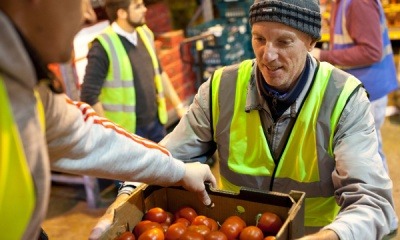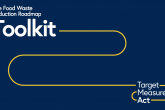Gove pledges £15m to reduce UK food waste
Environment Secretary Michael Gove has announced £15 million of funding for a new government scheme to reduce food waste.
At the Conservative Party conference in Birmingham on Monday (1 October), Gove described the UK’s food waste problem as “morally indefensible” for the harm it causes to both the environment and business.
Every year in the UK, according to the latest figures from the Waste and Resources Action Programme (WRAP), around 10 million tonnes of food is wasted, 60 per cent of which could have been avoided.

Of this waste, WRAP estimates that around half (100,000 tonnes, or 250 million meals) is edible and easily accessible but still goes uneaten, ending up in energy-from-waste, anaerobic digestion (AD) or going towards animal feed when it could have been redistributed to charities and communities in need.
“In the coming months we will work closely with business, charities and volunteers to deliver a new scheme to tackle this problem,” Gove said. The scheme, to be developed in partnership with businesses and charities, will launch in 2019/20 with a focus on reducing the amount of edible surplus that goes to waste.
There are already around 43,000 tonnes of food redistributed by businesses to those in need, as Dr David Moon, Head of Business Collaboration at WRAP, acknowledged: “Between 2015 and 2017 surplus food redistributed from retailers, manufacturers and hospitality and food services businesses increased by 50 per cent, with nearly £130 million worth of food saved from waste.
“[But] there is the potential to increase this significantly, and to expand the range and type of foods with more fresh produce. Not only will this benefit people, it will also help reduce the huge environmental impact of food waste.
“Today’s announcement is a great boost for the many support networks around the country working hard to ensure good food feeds people, and is not wasted.”
One such network is FareShare, which works with major retailers across the UK including Asda, Tesco, Sainsbury’s and Co-op, as well as a large number of growers, producers and packers, to redistribute their surplus to charities. Back in April, FareShare called on the government to increase its spending on food waste redistribution to the tune of £15 million – so the organisation has welcomed the news of this funding boost.
‘Right now, it costs farmers less to dump fresh food than to redistribute it’
FareShare CEO Lindsay Boswell said: “We congratulate Michael Gove for responding to our call to use surplus food for social good. £15 million can create almost 250 million meals worth of food for those in need, preventing in date food from being wasted… This food will go to frontline charities such as breakfast clubs for children, hospices, domestic violence refuges and homeless hostels.”
Boswell was keen to also point out the financial benefits of reducing food waste, stating that the new scheme could deliver “almost £800 million a year in overall savings, both in cash terms for the charities themselves and the knock-on savings to schools, the NHS, within the criminal justice system and in health and social care.”

“Right now it actually costs farmers, manufacturers and packers a lot less to dump or recycle fresh, in date food than to redistribute it to good causes – in part because of the cost of keeping the surplus food fit for human consumption. With the barriers to charitable food redistribution removed, businesses will no longer be penalised for doing the right thing with their food: using it to feed people.”
While Boswell stated that the fund should mainly apply to producers, there is still a long way to go before retailers are redistributing all of their surplus food. A June report by food waste charity Feedback, which ranked UK supermarkets on their efforts to tackle food waste, highlighted that Tesco sent nearly 20,000 tonnes of edible surplus to AD in 2017/18 – and only donated 7,975 tonnes through work with FareShare. Despite this, Tesco ranked at the top of the list for redistribution, showing that more concerted action could be taken by all UK supermarkets.
Carina Millstone, Executive Director of Feedback, said it was “heartening” to see the government working to increase the redistribution of surplus food, but added: “The challenge remains for supermarkets to find ways to reduce how much waste they generate in the first place. Using public money to clean up the supermarkets’ addiction to waste isn’t progressive; it could even turn out to be a get out of jail free card for a broken supermarket model that puts the retailers’ bottom lines above our long-term food future.”
One step towards addressing this challenge could come from WRAP’s new Food Waste Reduction Roadmap, a voluntary agreement which seeks to improve transparency around food waste data and encourage businesses to take individual and collective action. More than 80 businesses, including all the major UK supermarkets, have so far pledged to reduce waste across their operations in line with Target 12.3 of the UN Sustainable Development Goals – to halve consumer and retail food waste by 2030.








